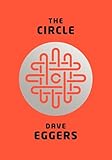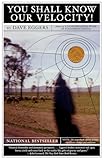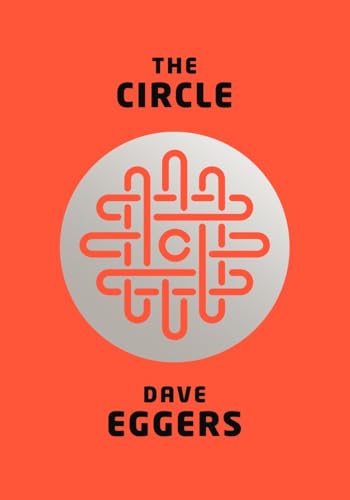 If every book review you read about The Circle makes some reference to 1984, it is not simply because all book reviewers are creatively exhausted, overworked sheep, but because Dave Eggers practically leaps off the page of his new novel to remind us of its lineage. When one of the founders of the Circle, a technology company with designs at market and world domination, sits down for a scripted come-to-Jesus with an errant employee –our heroine, Mae–three phrases appear on the screen behind them, arranged on the page the very same way readers first encountered that other trifecta of slogans almost 65 years ago.
If every book review you read about The Circle makes some reference to 1984, it is not simply because all book reviewers are creatively exhausted, overworked sheep, but because Dave Eggers practically leaps off the page of his new novel to remind us of its lineage. When one of the founders of the Circle, a technology company with designs at market and world domination, sits down for a scripted come-to-Jesus with an errant employee –our heroine, Mae–three phrases appear on the screen behind them, arranged on the page the very same way readers first encountered that other trifecta of slogans almost 65 years ago.
SECRETS ARE LIES
SHARING IS CARING
PRIVACY IS THEFT
When Mae inadvertently witnesses a modest marital handjob between her parents and simultaneously broadcasts it to an audience of thousands, her distress is soon quelled by the knowledge that “it would be only a matter of time. They would find each other, soon enough, in a world where everyone could know each other truly and wholly, without secrets, without shame…” Or, in Orwellian terms, “the place where there is no darkness.” Mae has her own Golden Country, the serene waters around San Francisco, where she kayaks among seals and prole-y old-timers who live on a barge. The social media activity of Mae and her fellow Circle employees is aggregated, and each employee receives a score, or “PartiRank.”
 In 1984, the Party has dispensed with the idea that the current state of affairs has any relation to the common good. As O’Brien tells Winston Smith during the course of his re-education:
In 1984, the Party has dispensed with the idea that the current state of affairs has any relation to the common good. As O’Brien tells Winston Smith during the course of his re-education:
Do you begin to see, then, what kind of world we are creating? It is the exact opposite of the stupid hedonistic Utopias that the old reformers imagined. A word of fear and treachery and torment, a world of trampling and being tramped upon, a world which will grow not less but more merciless as it refines itself. Progress in our world will be progress toward more pain…If you want a picture of the future, imagine a boot stamping on a human face — forever.
The rhetoric of the Circle is the reverse of this. Homelessness, pedophilia, low voter turnout, the pressing problem of not knowing how much sand is in the Sahara — the Circle is on top of all of these. Sharing is caring! However, the result is exactly that which O’Brien promises for the citizens of Oceania: “Already we have cut the links between child and parent, and between man and man, and between man and woman…in the future there will be no wives and no friends.”
Unsurprisingly, Mae’s unwitting broadcast of her parents’ sex life to the universe causes them to flee their home and suspend contact. Mae’s own re-education into a proselytizer for total transparency (read: zero privacy) puts an abrupt, grim end to her relationship with her technophobe ex-lover. Mae’s romantic life eventually devolves into watching the premature ejaculations of a fellow company striver, and then providing him with a user experience rating.
 1984 is what the The Circle asks to be identified with, and I appreciated Eggers’s attempt to contextualize, his method of achieving the same end through different rhetoric. At several points, I was also reminded of Lois Lowry’s The Giver, probably one of the greatest young people books of all time. When newly employed Mae is admonished by a communications staff member for not setting up her “company social account” and fails to grasp the importance of the “extracurricular” use of social media, she expresses her contrition thus: “I’m sorry to have misstated my feelings” — this is right out of The Giver’s system of apologies for failure to use precise language, for inconveniencing classmates, for being late, for causing anguish.
1984 is what the The Circle asks to be identified with, and I appreciated Eggers’s attempt to contextualize, his method of achieving the same end through different rhetoric. At several points, I was also reminded of Lois Lowry’s The Giver, probably one of the greatest young people books of all time. When newly employed Mae is admonished by a communications staff member for not setting up her “company social account” and fails to grasp the importance of the “extracurricular” use of social media, she expresses her contrition thus: “I’m sorry to have misstated my feelings” — this is right out of The Giver’s system of apologies for failure to use precise language, for inconveniencing classmates, for being late, for causing anguish.
The creepy nightly sharing-of-feelings, the Socratic-style instructional conversations, the ostensibly benevolent paternalism of The Giver are also a feature of The Circle, as here, during the conversation between Mae and Circle head Eamon Bailey (or “Uncle Eamon”) that marks Mae’s transformation from lone rule-breaker to proponent of collective onscreen life:
“I have a question, Mae. Do you behave better or worse when you’re being watched?”
“Better. Without a doubt.”
‘When you’re alone, unwatched, unaccountable, what happens?’
“Well, for one thing, I steal kayaks.”
The audience laughed in a sudden bright burst.
“Seriously. I do things I don’t want to do. I lie.”
The best-known dystopian novels show the horrors of society through the futile resistance of one soul, who is deviant through some quirk of temperament, a touch too much alcohol in their incubation solution, an ability to See Beyond. They don’t always have to be likable, but they have to be struggling. For the first bit of The Circle, it seems that Mae harbors some form of this leading-man deviance. She kayaks alone. Before she comes to work at the Circle, it is not her custom to Zing (Eggers’s version of Twitter) about everything that happens to her. She seems to understand that it is not in keeping with HR best practices to be called to the carpet for failing to RSVP to a “brunch for all staffers who had demonstrated an interest in Portugal.” When Mae so quickly morphs from good German to the worst German, it is jarring because it is not in keeping with the form, and because it offends our sensibilities as reasonable people.
We know some things about why Mae might go over to the dark side, namely, that she has skin in this game. Eggers has made her into the American Millenial everywoman, with everywoman’s attendant problems. She has a $234,000 education from Carleton College, and is on the hook for some not insignifacant portion thereof. Mae’s $62,000 starting salary at the Circle allows her to make loan payments and pay rent on a a dingy shared apartment. Mae’s dad, a former parking garage owner, has multiple sclerosis, and her parents spend most of their time managing his care and dealing with the insurance company, which, with the conveniently topical shittiness of insurance companies across the nation, has decided to drop his medication from its list of pre-approved drugs. When Mae is able to get her parents on the Circle’s health plan (which, it goes without saying, transcends Cadillac status; it’s the Maybach — no, the Tesla — of health plans), this plot device becomes the by-then superfluous tether tying Mae to the Circle. This is the real-life stuff that undergirds the plot of The Circle, but like other elements of this novel, it seems to have been built quickly and clunkily enough that it doesn’t quite feel load-bearing.
We are meant, I think, to relate to Mae. But by the time Mae is leading a world-wide electronic manhunt for her ex-boyfriend to demonstrate the efficacy of the Circle’s new SoulSearch program, when she is saying “Release the drones!” in “a voice meant to invoke and mock some witchy villain,” when she is proposing that every American be required to have a Circle account and transact all their civic business therewith, when this all seems to have happened within six weeks of her date of hire (serious question: is she still making $62,000 when she sketches out the annihilation of liberty?), Mae has left everywoman territory. Retroactively, her parents’ plight seems too unsatirical: if it is to scale with the excesses of the Circle’s plotting, her mother should have Type II Diabetes and be a veteran who lost her VA benefits and gave birth to octoplets after an unethical doctor implanted all of the fetuses. Her dad should have lost his garage due to a situation involving mortgage-backed securities and Islamic fundamentalism.
The Circle occupies an awkward place of satire and self-importance. What it does very well is create a catalogue of awful techno-cum-Landmark Forum-cum-HR-cum-feelings-speak. Uncle Eamon is legitimately avuncular and creepy. When Mae is chastised for failing to Zing about her hobbies, a colleague says “‘Just kayaking? Do you realize that kayaking is a three-billion-dollar industry? And you say it’s ‘just kayaking’! Mae, don’t you see that it’s all connected? You play your part. You have to part-icipate.'” And this stuff is often very funny. (These days, though, it’s hard to write a novel that can rival the comedy gold of reality. This week, Nathan Heller has a piece in The New Yorker about San Francisco’s startup culture: “The company had needed to figure out whether to spend its limited budget on beef jerky to keep around the office or 401k plans for the staff. ‘We put it to a vote: ‘Do you want a 401k or jerky?…The vote was unanimously for jerky. The thought was that well-fed developers could create value better than the stock market.'” Or this gem: “Serge was a software professional who, in his spare time, led people into deeply meditative states from which they could reëxperience earlier lives. Some people found that passing through past lives eased their fears of death, Serge told me that evening.”)
Orwell wrote 1984 from a knowledgeable position, as a person who had invested himself corporeally in the political system that he was later moved to skewer in his writing. Eggers, meanwhile, has been very open about his position vis–à–vis the facts of tech culture, a position that might be stated as IGNORANCE IS STRENGTH. There is some merit to the idea that the public perceptions of a company, particularly the storied, insular, tech giants, are as good as reality, but we wonder if Eggers is the right person to explain the specifics of why technology is scary. Mae’s nighttime kayak joyride, for example, seemed a strange catalyst for her re-education as an enthusiastic Circler. San Francisco residents are very sensitive to the perceived entitlement of the tech class, and spend the days reflexively muttering “Google bus” under their collective breath; when Mae borrows the kayak, a spontaneous, independent, un-Zinged act that brings about her meeting with Uncle Eamon, I was conditioned by my resentment to see it as evidence that she was starting to become a typical tech douche, who feels entitled to “disrupt” the rules of a lowly kayak rental facility. The fact that this is perceived as a major transgression at the Circle, and the Circle’s general obsession with “finding community” and normalizing behavior, rang a little bit false. (My own position, admittedly, is equally ignorant.)
 Eggers’s anxieties about technology are not new. In his first novel, You Shall Know Our Velocity!, now more than a decade old, Eggers’s affable narrator and his sidekick, Hand, met a man in Senegal who “worked in cellphones.”
Eggers’s anxieties about technology are not new. In his first novel, You Shall Know Our Velocity!, now more than a decade old, Eggers’s affable narrator and his sidekick, Hand, met a man in Senegal who “worked in cellphones.”
Something involving GPS and cellphones and how soon enough, everyone would know–for their own safety, he insisted, with a fist softly pounding the table, in a way he’d likely done a hundred times before — where everyone else in the world was, by tracking their cellphone. But again: for good not evil. For the children. For the children. For grandparents and wives. It was the end of an epoch, and I didn’t want to be around to see if happen; we’d traded anonymity for access. I shuddered. Hand, of course, had goosebumps.
The children are invoked again in The Circle — concern for their well-being given as the motivation for a program of tagging and tracking that will eventually lead to an orgasmic union of state and corporate interests, the whole of a person’s data existing within one platform and operating system.
Eggers’s first novel is a humble tale about buddies and grief that channels a really lovely Bellovian style of joyful despair (“I look at the file, and its contents scream at me in a voice containing thousands of murders in unclean homes”). Perhaps the style of The Circle is a subversive comment on the uniformity that will be visited upon us by the tech overlords–revisiting his first novel renders the prose of his latest rushed and merely functional by comparison. “‘Hi Mae,’ a face said as it floated, gorgeous and smiling, toward her” hearkens back to Mae’s first day, when she encountered “a beautiful young head floating atop a scarlet scarf and white silk blouse.'” When Mae meets her team leader, she sees a “handsome man, compact and tidy.” Eggers’s prose has felt more alive than this.
His relationships have felt more alive, too. You Shall Know Our Velocity is founded on friendship, and friendship is likewise a central plot element of The Circle. Mae is brought on board by Annie, who has rapidly risen through the ranks of the Circle. Annie and Mae met in college and formed an “extraordinary bond, something like friends, something like sisters or cousins who wished they were siblings and would have reason never to be apart.” This turns out, though, to be a fickle sort of friendship; when Mae comes to occupy permanent Employee-of-the-Month status at the Circle, the friendship immediately falls apart. (You know. Ladies be resenting.) If this novel is meant only to serve as a savage farce, a detail like this isn’t important. But we don’t always know where we are in this novel, what sort of expectations are reasonable. A lot of it feels farcical, but when you invoke 1984, the implications are deadly serious.
One of my favorite moments in 1984 is when Winston Smith sits down to perform the physical manifestation of his Thoughtcrime by putting pen to paper, and is overwhelmed by the prospect.
How could you communicate with the future? It was of its nature impossible. Either the future would resemble the present, in which case it would not listen to him, or it would be different from it, and his predicament would be meaningless.
In that spirit, I will share that I write all my reviews as Gmail draft messages. While I was writing this one, my netbook finally gave up the ghost and I wailed and gnashed my teeth and hauled an eight-year-old iBook out of the closet and again wailed and gnashed my teeth when I was unable to download Google Chrome because the operating system was too old, and I actually cried because it felt like nothing in my life was working. I unwind from a busy work day by compulsively heart-ing the photos on my friends’ and acquaintance’s Instagram feeds. My PartiRank score, if I say so myself, would not be negligible. The chilling implications of this novel were not at all lost on the part of myself that asks the other part why I know that I have three fewer Twitter followers than the last time I checked, and why I care.
There are noble impulses behind this novel–to prophesy, to warn, and to entertain–and it basically delivers on these fronts. But The Circle boldly asks us to reckon it alongside one or more of the most, to use the odious word, impactful, novels of the 20th century, and it’s not bold enough to carry that weight. It seems to hedge its bets, so that it is just a little bit sad, a little bit funny, a little bit scary, and a little bit thin. A little bit beta, if you will.





